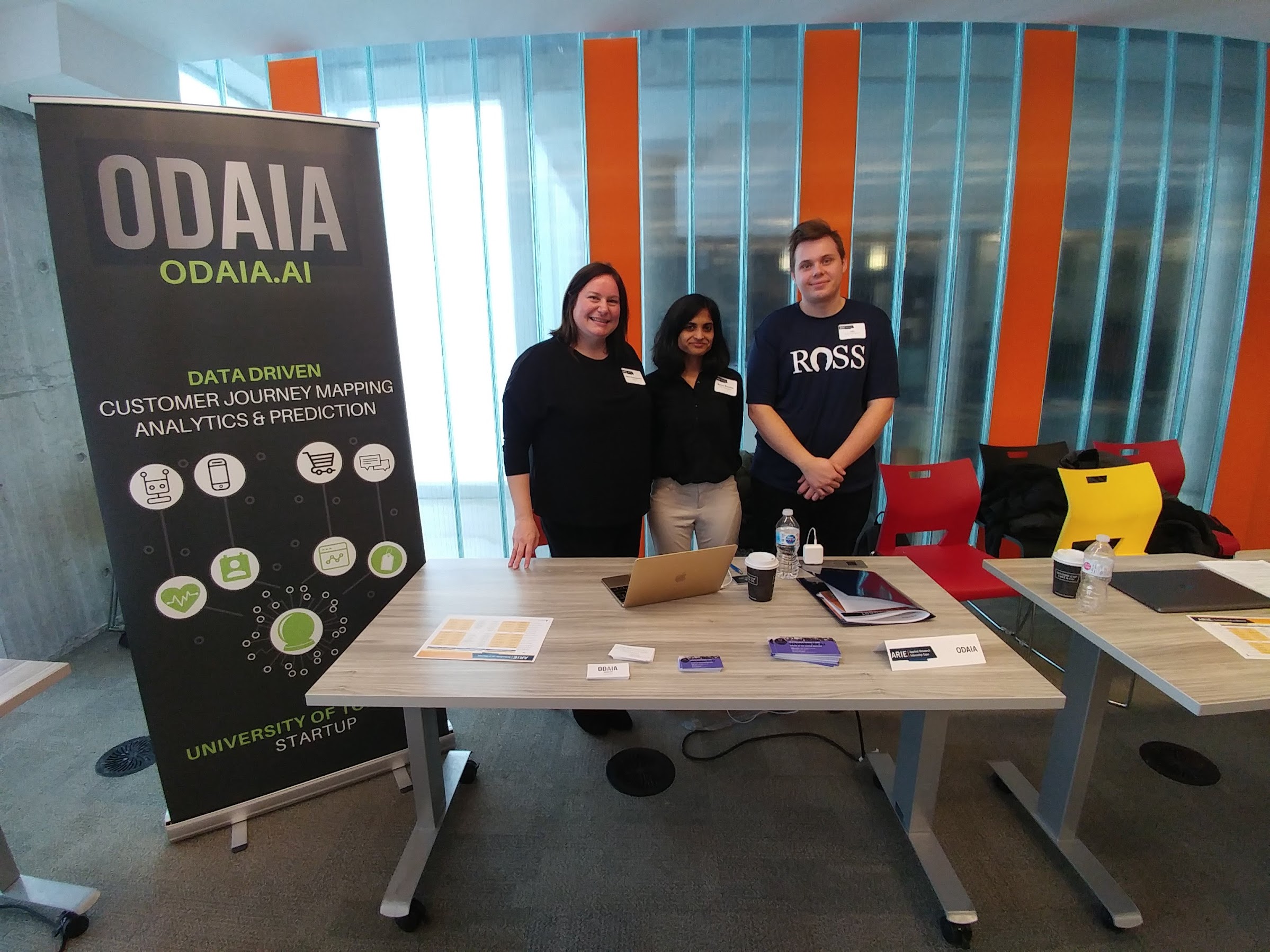Helen Kontozopoulos is Adjunct Professor at the University of Toronto, where she teaches product development, design, and entrepreneurship in the Department of Computer Science, and the Department of Computer and Mathematical Sciences. In 2018, she co-founded ODAIA, a Canadian-Swiss startup, to develop a customer journey analytics and prediction platform for companies. As Chief Growth Officer, she brings her understanding of AI, customer journeys, digital transformation, and the future of work to help companies become more resilient and creative using emerging technologies.
We met an anthropologist who built websites as a teen, a computer science professor who is not a “tech girl” – in other words, a truly rich personality! Helen built “her own ladder” and encourages other women to do the same. We love that she encourages women to create good networks. “You can’t stop a community of women”, she said. We definitely agree.
Get inspired by her story and share it around.
Can you describe your path to becoming a tech leader? What and / or who helped you in your professional choices?
My educational background is not in technology. But I always loved tinkering with technology. I was always interacting with computers when I was a kid. I was in special education, not particularly good at school, so the teachers put me in front of a computer and I would play all day. I have been making websites since 1997.
I love culture, humanities and the arts and that is what I learned at University. I studied anthropology and classics. I was supposed to become an archaeologist and went on a dig in Israel in the summer, and I realized I wasn’t cut out for digging…
I love anthropology. I love understanding people… and understanding what humanity has done since the beginning of time until now.
Moving forward, I did a Master’s in business – marketing and analytics. At that time, I started looking at how I could use analytics to understand people. I realized that I was quite good at watching people, understanding their behavior and helping businesses get to know their customers.
My life changed in 2011 when I decided that I wanted to be the maker of the [tech] tools, not just the user of them. That was a conscious decision. I was using all these mobile and web dev tools for work, and I realised for me to have more control of my future career path I needed to be the one either building the tools or supporting their creation and design. This thinking really changed my life.
Technology has always been a tool for me and it always inspires me, Recently I did an executive professional certificate at MIT on technology and innovation, it was more of a pilgrimage to the place Marvin Minsky taught, whom I met in 2013, this was another turning point in my life that inspired me to start studying artificial intelligence and society.
I might not be the typical “tech girl”, yet, my whole life has led me to become an Adjunct Professor at the University of Toronto in the Department of Computer Science for the last seven years, and I also co-founded the Department of Computer Science Innovation Lab – a startup incubator for students and researchers, creating emerging technology startups.
I don’t have a plan. Life just leads you to your next position. It is really about the network and people we connect to.
This is how I met Periklis Andritsos and Gaël Bernard who told me about their academic work – understanding and analysing customer journeys by using artificial intelligence and process mining to build a world of personalized selling. This led to the foundation of ODAIA. Being a co-founder of an AI start-up in customer discovery and analysis seemed like the right step for me.
How does your work contribute to society?
For me, it has always been about humanity being empowered by technology. At ODAIA, we are creating a way to automate a lot of the marketing and sales functions and get personalized predictions. For example, Maptual is a sales and marketing automation platform for the life sciences industry. Maptual taps into existing data sources to deliver AI-enabled customer relationship management suggestions together with insights on marketing campaign effectiveness, health care professional journeys and segmentation.

“The future of work is the future of interaction. It is not something revolutionary, but it is going to start changing the way we make decisions. I’m always thinking about how the future of work is going to be impacted by technology, such as AI.”
So, then I think about how it is going to impact our lives and how we’re going to work. Our lives have really changed by using these types of tools.
Anthropology is my base, this affects the work I do now, I’m observing how people are interacting with each other and technology. That is what anthropologists are trained for. We are trained to observe and also to check ourselves, check our biases. I’m always re-checking who I am, and when I’m doing my work. I know where I’m coming from.
About ethics
I started having these ethical questions around our use of technology and its impacts on us as individuals, workers, and citizens for a very long time. I found that when I started teaching in technology, ethics wasn’t widely discussed in the product development courses, especially around data usage. Now everyone talks about ethics, ethics in AI and data. I think having a humanities and anthropology background helped me focus not only on building but on thinking, critically thinking. Thinking about cultural impacts and overall impacts on society I teach this in my classes and now use it my own startup.
How do you convince investors?
With persistence. As a startup founder, I have done a lot of pitches. Even when you are just walking down the street and you bump into someone you are always pitching. Pitching for a connection, a client, an investor or an employee – there is a continuous promotion of what you are doing.
Last year, we raised a seed round for ODAIA of 1.7 million Canadian dollars, from Canadian investors, such as Inovia and Panache ventures and we also received funding from investment funds for women in technology from BDC Women in Tech fund and StandUp ventures. This type of support has been amazing, not only receiving the funding to grow, but the coaching and personal development I receive as a woman founder.
Do you observe major differences on how science/technology is supported in Canada and in Switzerland?
There is a great emphasis in supporting women in technology and business in Canada including women entrepreneurship funds, such at BDC WIT Fund. Our Ontario government, the provincial government, also provides funding and supports women groups and events and finally we have a very active and supportive private sector which funds women initiatives, for example RBC has sponsored my Women in AI, and AI Week events in the past.
I haven’t seen enough funding of women startups in Switzerland, but I would like to be proven wrong.
There are encouraging signs though, I had a few interactions with the Swiss Consulate at Collision 2019, a startup tech conference held in Toronto, and the delegation was very open to support startups to move to and collaborate in Switzerland. I think there is a lot of startup potential in Switzerland.
Plus you have the best selling authors of the Business Model Generation out of Switzerland Alexander Osterwalder and Yves Pigneur, who are leading in teaching how to design tech business models. Yves visited my lab in Toronto and ran an amazing workshop in 2017.
What, in your view, is the role of public relations in supporting science and technology and how do you use them in your own strategy?
I’m always talking – I know it sounds funny [laughs]. I’m always speaking at events to promote technology and emphasise how to incorporate digital and technical skills into the education system. But what really works, is inviting people of different backgrounds, ages, and genders to represent the diversity that tech holds. So the audience can see themselves in the speakers on the stage, they become your perfect PR tools, we want the audience to be encouraged to get into science and technology by seeing their future selves.
Should you encourage young girls to get into science/technology, what would you say ?
I would love for more young girls and women of any age to get into tech. We need to encourage female participation and be active in supporting engagement in the tech community. I am organizing International Women’s Week events for March 2021 and I am thinking about how I can encourage young women and girls to take part – I keep in mind what content will resonate with a young audience. It’s all about supporting resilient thinking and helping young girls get ready for the future. So it might include code, prototype, data, AI, and startup bootcamps – who knows, as long as it is fun and relevant to their lives.
Is there something you would do differently or advise young entrepreneurs to avoid doing?
I advise young entrepreneurs of any background to talk to users right away. They have to get out there and learn about their industry and the user. They have to understand the customer journey. Test and think before you build – that is what I tell my students every day, and my team too.
I think that this is a problem in tech – People develop products before knowing if there is a need or users for them
Researchers live in a bubble while everything else is happening in the world. Just because the technology is better or faster, it doesn’t mean it is needed and going to be used. At the end of the day, it is really the customer who decides. It is the user, it is the citizen, it is the patient. It goes down to the human need, want, and desire.
An anecdote to share with us about your journey as a women, a women in tech, a leader ?
We have 40 percent women in our company, and most of them are technical developers, with two women in leadership. I would love to see more women who are CEOs from both technical and business backgrounds, they should lead. We need to move women up so they can make more money and make more leadership decisions in their organizations.
“We need to start encouraging women to become founders so they can make more women founders. More women CEOs and leaders changes cultures and makes more women CEOs. I see it in myself, leaders breed more leaders. They also invest in future leaders.
Being in power positions is scary and you may fail. But guys fail all the time! or at least in Silicon Valley they do, and they wear their failure as a badge of honor. When a woman fails, she thinks she is the worst person in the world – like, look at me, I am horrible. Don’t hire me again. It feels like a stain on your career. But it shouldn’t be like that, and first we have to take ownership of our failures and successes, so we can show other women that it’s ok and it’s totally ok to take risks and it should be encouraged.
Women can really step up. I prefer women creating their own companies and creating new cultures and not trying to “go up that corporate ladder”. Tear down the ladder, create your own ladder!
All these women in the 80s and 90s, trying to climb up that corporate ladder and get to the top. OMG. You remember that. Play the game – but the game sucks. Well, you know what? You want to move up in a bank? Make your own bank, it’s called fintech! We have all the resources we need, the tech is there, we can build it for ourselves. Otherwise, if we are waiting to be accepted, nothing is going to happen. We need to do something else, not try to fit in the box.
I found that I could build my own ladders with my startup community and women leaders network. You can’t stop a community of women who want to build their own opportunities and futures. I’m just here to try to help to make that happen.


